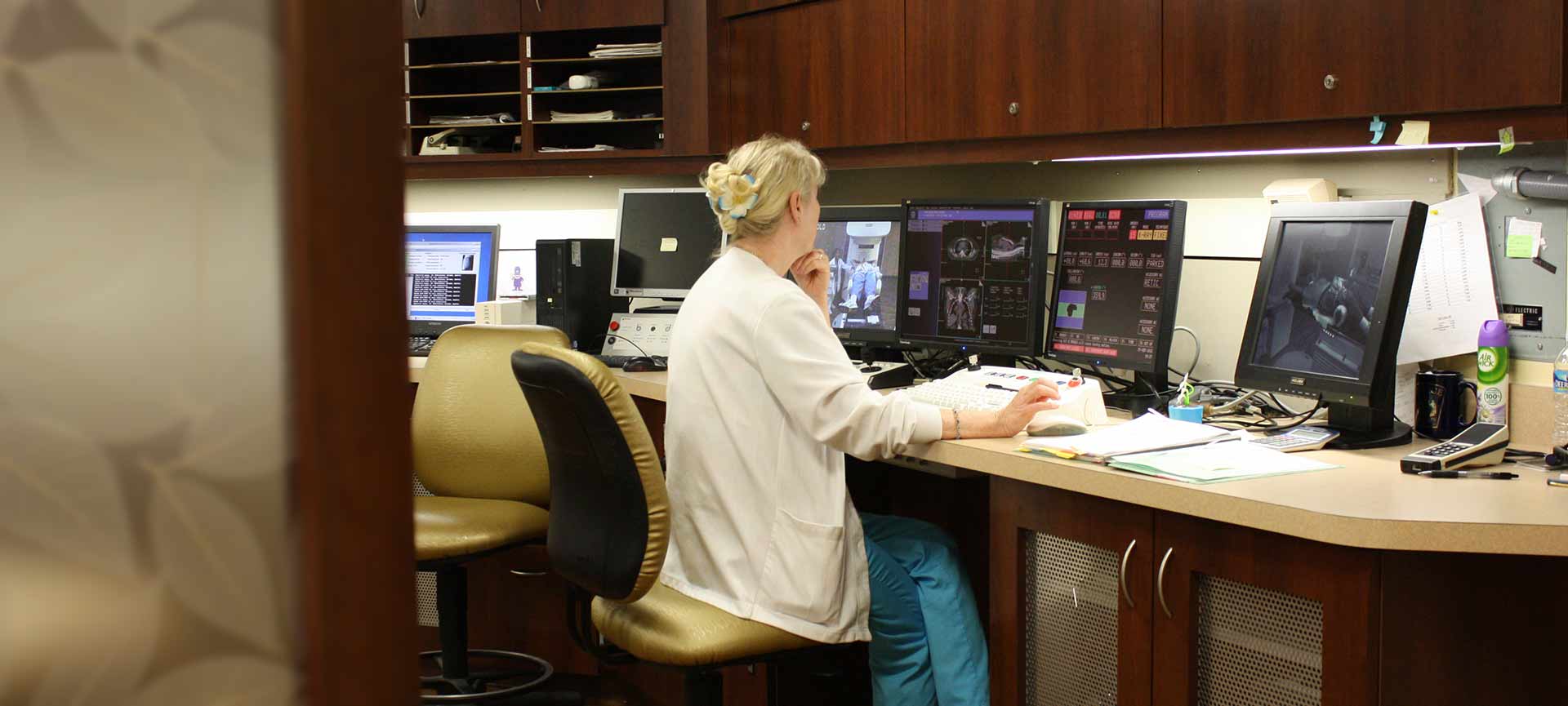Radiation Oncology at GBMC
Frequently Asked Questions
What is Cancer?
Cells in the body start out normal, growing and dividing the way they should. Normal cells become cancer cells when they begin to grow and divide uncontrollably. This crowds out the normal, healthy cells. A group of cancer cells is called a cancer tumor. It is possible for these cancer cells spread to other parts of the body.
What is radiation therapy?
Radiation therapy is the use of radiation, high-energy photons, and/or high-energy electrons, to treat cancer. The radiation can be delivered from outside the body (external beam radiation therapy - EBRT) or from inside the body (brachytherapy). With external beam radiation therapy, a machine directs beams of high-energy photons at the tumor. With internal therapy, radioactive sources are placed in or around the cancer tumor.
Watch a video from the American Cancer Society and Emmi Solutions giving more details on radiation therapy.
How does radiation therapy work?
Radiation therapy uses energy to treat cancer. The energy may be beams of x-rays aimed at the cancer from outside the body (external radiation therapy), or given by radioactive implants placed inside the body near the cancer (internal radiation therapy, also known as brachytherapy). In either case, the radiation destroys the cancer cells gradually, over time. The goal of therapy is to focus on and kill as many cancer cells as possible; but the radiation will damage or kill some of the normal cells that are closet to the tumor. Damaged normal cells can often repair themselves, often within a day or so.
Does radiation therapy hurt?
No. Receiving radiation does not hurt. However, radiation therapy can result in some uncomfortable side effects, most of which are temporary.
What are possible side effects?
Radiation therapy can create side effects. These side effects happen because normal cells are affected by treatment. Keep in mind that having side effects does not mean that your cancer is getting worse or that therapy isn't working. Most radiation therapy side effects stop when your treatment is over. Common side effects are fatigue, appetite changes, and skin reaction at the treatment site. Other possible side effects depend on what area of the body is being treated. Examples of such side effects are hair loss in the area being treated, dry mouth if the head or neck is being treated, and bowel changes for treatment to the pelvic region.
How many radiation treatments will I need?
The number of treatments needed is depends on the patient and cancer being treated. A course of external radiation therapy is often one or more treatments five days a week for two to ten weeks.
Can I still work during my treatments?
Many people do still work during radiation therapy. You may need to talk to your employer about adjusting your schedule. Look into reducing the number of hours you work or work at home if you can. However, every attempt is made to make your appointment time to be as convenient for you as possible.
Can I exercise during my treatments?
Ask your doctor about starting an exercise program. It may help you sleep better, and sometimes help control some side effects. Exercise is also good for your body and your sense of well-being. Exercise during the times of day when you have the most energy, but don't push yourself. Even small amounts of exercise can help. Instead of jogging take a walk or ride a stationary bike.
Can I continue my other medications?
Give your radiation oncologist or radiation oncology nurse a complete list of all medicines you are currently taking, prescription and over-the-counter, for them to review. You will most likely be able to continue taking your current medications throughout treatment.
Cells in the body start out normal, growing and dividing the way they should. Normal cells become cancer cells when they begin to grow and divide uncontrollably. This crowds out the normal, healthy cells. A group of cancer cells is called a cancer tumor. It is possible for these cancer cells spread to other parts of the body.
What is radiation therapy?
Radiation therapy is the use of radiation, high-energy photons, and/or high-energy electrons, to treat cancer. The radiation can be delivered from outside the body (external beam radiation therapy - EBRT) or from inside the body (brachytherapy). With external beam radiation therapy, a machine directs beams of high-energy photons at the tumor. With internal therapy, radioactive sources are placed in or around the cancer tumor.
Watch a video from the American Cancer Society and Emmi Solutions giving more details on radiation therapy.
How does radiation therapy work?
Radiation therapy uses energy to treat cancer. The energy may be beams of x-rays aimed at the cancer from outside the body (external radiation therapy), or given by radioactive implants placed inside the body near the cancer (internal radiation therapy, also known as brachytherapy). In either case, the radiation destroys the cancer cells gradually, over time. The goal of therapy is to focus on and kill as many cancer cells as possible; but the radiation will damage or kill some of the normal cells that are closet to the tumor. Damaged normal cells can often repair themselves, often within a day or so.
Does radiation therapy hurt?
No. Receiving radiation does not hurt. However, radiation therapy can result in some uncomfortable side effects, most of which are temporary.
What are possible side effects?
Radiation therapy can create side effects. These side effects happen because normal cells are affected by treatment. Keep in mind that having side effects does not mean that your cancer is getting worse or that therapy isn't working. Most radiation therapy side effects stop when your treatment is over. Common side effects are fatigue, appetite changes, and skin reaction at the treatment site. Other possible side effects depend on what area of the body is being treated. Examples of such side effects are hair loss in the area being treated, dry mouth if the head or neck is being treated, and bowel changes for treatment to the pelvic region.
How many radiation treatments will I need?
The number of treatments needed is depends on the patient and cancer being treated. A course of external radiation therapy is often one or more treatments five days a week for two to ten weeks.
Can I still work during my treatments?
Many people do still work during radiation therapy. You may need to talk to your employer about adjusting your schedule. Look into reducing the number of hours you work or work at home if you can. However, every attempt is made to make your appointment time to be as convenient for you as possible.
Can I exercise during my treatments?
Ask your doctor about starting an exercise program. It may help you sleep better, and sometimes help control some side effects. Exercise is also good for your body and your sense of well-being. Exercise during the times of day when you have the most energy, but don't push yourself. Even small amounts of exercise can help. Instead of jogging take a walk or ride a stationary bike.
Can I continue my other medications?
Give your radiation oncologist or radiation oncology nurse a complete list of all medicines you are currently taking, prescription and over-the-counter, for them to review. You will most likely be able to continue taking your current medications throughout treatment.

